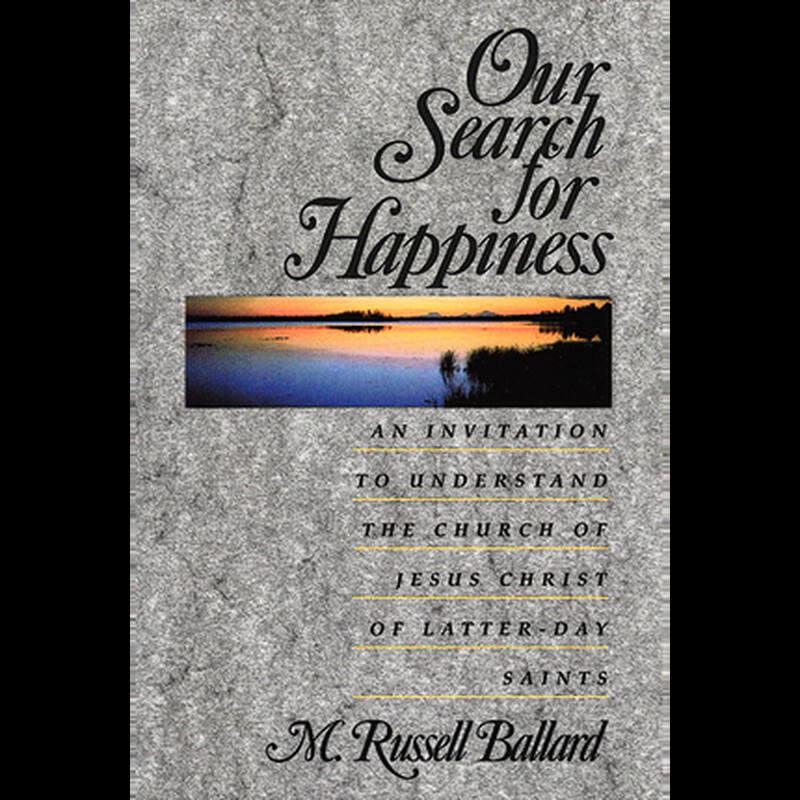President M. Russell Ballard was deeply passionate about sharing the restored gospel. Part of his rich legacy will be his beloved book Our Search for Happiness: An Invitation to Understand the Church of Jesus Christ of Latter-day Saints. More than half a million copies of the book have been sold and it is available in 12 languages, including Vietnamese, Italian, and Croatian.
What people may not know is the inspiring story of how the book came to be. A recently released video by the Church News features President Ballard explaining the book’s origins.
“I was chairman of the missionary executive council, and I kept telling everybody, ‘We need something simple; [something] that people could pick up in Salt Lake, get off the plane in Chicago and understand what the Church is all about,” President Ballard said in the video.
President Ballard continued to suggest his idea until one day, the committee suggested he write it. And with the help “of very good people” the book was born.
“I think every human being is searching for happiness, for peace, for direction, for purpose. And I believe Our Search for Happiness has touched the lives of a lot of people, and they have found their purpose and come to know that they are sons and daughters of God, that he loves them, and that He has a plan for them, and that plan is found in the Church of Jesus Christ of Latter-day Saints,” he said.
Watch the full video below, and then read a moving excerpt from Our Search for Happiness about why God allows suffering in the world.
Excerpted from Our Search for Happiness by President M. Russell Ballard.
Not long after my family and I returned home from our mission in Toronto, one of our young missionary friends appeared at our front door unannounced. He had been an outstanding missionary—one of our very strongest leaders—and now he, too, was home. And he was ready to move on with his life.
“President,” he said, “do you remember how you made us all promise that when we met someone we wanted to marry, we'd introduce them to you?”
“Yes,” I said, smiling, “I remember that.”
“Well,” he said with great flourish and obvious delight, “I’d like you to meet my fiancée!”
He introduced us to a wonderful young woman, and we spent a few minutes getting acquainted. It quickly became clear that she was every bit as faithful and strong as he. What a wonderful couple they made—so sweet, so pure, so very much in love. I was honored when they asked me to perform their temple marriage, which was scheduled to take place about three months in the future. We put a circle around that date on the calendar, and then I bade the young couple goodnight.
The next evening I received a telephone call with news that shocked me to the very soul. The young missionary who'd stood in my living room with his fiancée the night before had been killed in an automobile accident. Instead of officiating at his wedding, I was being asked to speak at his funeral.
For those whose understanding is limited to the confines of mortality, death can sometimes appear to be terribly cruel and capricious. Indeed, life itself is filled with harsh realities that tug at the heart and tear away at the soul. Child abuse. AIDS. Natural disasters, from hurricanes to earthquakes. Famine. Prejudice and intolerance. Humanity's ongoing inhumanity toward one another.
One cannot look at human suffering, regardless of its causes or origins, and not feel pain and compassion. It is easy to understand why one who lacks an eternal perspective might look at horrifying news footage of starving children in Africa or the devastation of a hurricane and shake a fist at the heavens.
“If there is a God,” the empathetic observer might wonder, “how could He allow such things to happen?”
The answer isn’t easy, but it isn’t that complicated, either. God has put His plan into motion. It proceeds through natural laws—which are, in fact, God’s laws. And because they are His, He is bound by them, as are we. In this imperfect world, bad things sometimes happen. The earth’s rocky underpinnings occasionally slip and slide, and earthquakes result. Certain weather patterns turn into hurricanes, tornadoes, floods, and drought. That is the nature of our existence on this planet. Dealing with adversity is one of the chief ways in which we are tested and tutored.
Sometimes, however, adversity is man-made. That is where the principle of agency again comes into play. Keep in mind that we were so excited about the plan Heavenly Father and Jesus Christ presented that we literally “shouted for joy” (Job 38:7.) We loved the concept of mortality and the exciting notion of moral agency. But because we'd never been mortal before, I’m not sure we could fully comprehend the impact of agency on our lives.
We tend to think of agency in a personal way. Ask someone to define “moral agency” and they’ll probably come up with something like this: “Moral agency means I’m free to make choices for myself.” But we forget that agency also offers that same privilege to others, which means that sometimes we are going to be adversely affected by the way other people choose to exercise their agency.
Heavenly Father feels so strongly about protecting our moral agency that He will allow all of His children to exercise it—for good and for evil. Of course, He has an eternal perspective that helps Him to understand that whatever pain and suffering we endure in this life, regardless of its origins and causes, it is only a moment compared with our entire eternal existence.
By way of illustration, let's say you had a rope that extended both directions off into the cosmos—forever. And let's say you took a single strand of thread and wrapped it around the rope once at its midpoint. The rope to the left of the thread could represent our life before birth. The rope to the right of the thread could represent our life after death. And that single strand of thread would represent the span of our mortal lives here on earth in comparison to eternity.
Sort of puts it in perspective, doesn’t it?
Of course, we mortals can rarely view life from that perspective. Instead, we feel pain and anguish in the face of adversity—for ourselves and for others. But faith in our Heavenly Father and in His plan can be a source of inner strength through which we can find peace, comfort, and the courage to cope. As we put our faith and trust to work, hope is born. Hope grows out of faith and gives meaning and purpose to all that we do. It can give us comfort in the face of adversity, strength in times of trial, and peace when there is every reason for doubt and anguish.
I felt that comfort, strength, and peace as I stood before the huge congregation that had gathered for my young missionary’s funeral. As I looked into the faces of his family, fiancée, and friends, I felt the comfort that comes through knowing and accepting God's eternal plan. Although we would all miss him, we shared in the knowledge that life is eternal and that my missionary would be separated from us for only a season. One day, we knew, we could all be together in God's kingdom—if we chose to live as well and faithfully as he did.
Thus illuminated by the light of faith, adversity becomes a vehicle for growth and death becomes a doorway from one phase of our eternal existence to another.



